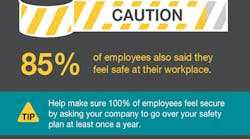Only Half of Employees Feel Their Employers Are Prepared for a Severe Emergency
Only half of employees believe their workplaces are prepared for a severe emergency, according to the third annual workplace safety survey by Staples Inc. And nearly two-thirds of those polled said recent natural disasters have not led to their employers reassessing company safety plans.
The survey, in honor of National Safety Month, also reveals that in the past six months, nearly half of businesses have closed due to severe weather, costing the economy nearly $50 billion in lost productivity.
“Safety is a top priority for employers, but there is still more planning and training that can be done to improve safety in the workplace,” said Bob Risk, national safety, health and wellness manager for Staples.
The Top Safety Concerns
According to the survey, the top three safety concerns for employees are:
Slips, trips and falls: One in five report slipping, tripping or falling at work as their biggest concern. Accidents involving slips, trips and falls send 9 million people to the hospital each year and are a leading cause of workers’ compensation claims, costing an average of approximately $20,000 per injury.
Natural disasters and storms: Less than half of employees say their employers have the plans or equipment in place for snow and ice storms, or catastrophic events such as tornadoes, hurricanes or earthquakes. According to the Institute for Business and Home Safety, an estimated 25 percent of businesses do not reopen after a natural disaster.
Fire: Fire is one of the most common safety incidents, but most employees feel their companies are well prepared. Three-fourths say their employers have a plan and equipment in place for a fire emergency.
Small Business Employees Feel More At Risk
The survey finds workers at businesses with fewer than 50 people are less aware or less sure who is in charge of emergency planning than employees at larger companies. Employees from smaller companies report having less emergency equipment or plans in place, are less likely to do safety reviews or drills, and are less prepared for severe emergencies than their counterparts at bigger organizations.
Staples offers these tips for a safer working environment:
- Businesses should assess and make sure they comply OSHA regulations. While exact safety products may differ between businesses, a good starting point of must-have safety products includes first-aid kits, fire extinguishers, crank-powered cell phone chargers and flashlights, personal protective equipment (such as protective clothing and respiratory protection), and the following emergency items: water/food, blankets, and exit signs.
- A good safety plan includes procedures to respond to various emergency situations, methods to recover and maintain business continuity, securing adequate resources and supplies for crisis events and employee training.
- To help limit slips, trips and falls in the workplaces, businesses should be vigilant about cleaning up spills immediately and posting signs identifying hazards, such as wet surfaces or areas that are being cleaned. Electrical cords often are an overlooked hazard – make sure these are not laid out in heavily foot traffic areas.
Find out how your company compares by taking answering five questions in the interactive infographic, How Safe Is Your Company?

